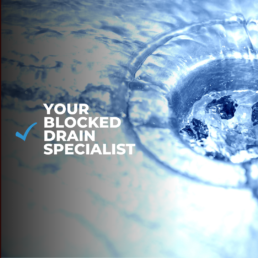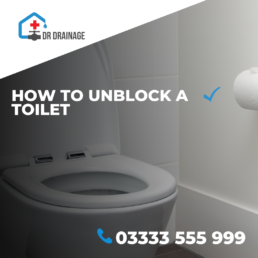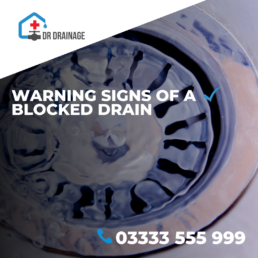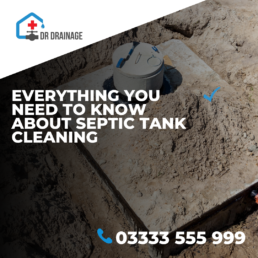How to Unblock a Toilet
Unblock a toilet Leeds
Everyone has been there. All of a sudden, the toilet fills up ominously when you flush it and then doesn’t drain away as it should. Most of the time, the problem resolves itself and the water will eventually drain away. But on some occasions, the waste water either doesn’t diminish, or the toilet keeps blocking repeatedly. Knowing what the signs of a blocked toilet are, and how to deal it can help prevent a highly unsanitary situation from developing or becoming worse, Dr drainage details how to unblock a toilet.
Signs of a blocked toilet
This is not a glamarous subject, but an important one nonetheless. All too often, people will ignore the signs of a blocked toilet, because as mentioned above, frequently, a toilet will end up clearing naturally. But if you notice any of the following, on a regular basis – then it’s time for action.
- A bad smell – Yes – we know – bad smells are naturally associated with toilets. But if there is a lingering bad smell which seems to emanate around the house, this can be a sign that the drainage pipes have a blockage somewhere and waste might be backed up
- Gurgling sounds – Water often makes a sucking or squeaking sound when draining away, but if there are persistent gurgling noises happening, even when you aren’t using any water, this is an early warning sign that water isn’t flowing freely through the pipework
- Slow draining water – If your toilet bowl fills up and either doesn’t drain away at all, takes longer than usual to drain, or it appears that your toilet keeps blocking, this is the number one sign that something is down there that shouldn’t be!
What causes a blocked toilet?
Anything that goes into a toilet should be degradable in water. Anything that isn’t degradable will likely cause drainage issues with continued flushing of them. There are a great many items that do not belong in a toilet but the usual suspects that get flushed are items like wipes (baby wipes, makeup removing wipes) feminine hygiene products, rubbish (think hair balls, dust wiped from bathroom surfaces) and cosmetics. A surprising number of people will dispose of items down their toilets without thinking twice about whether they should be flushed into the water system. If this behaviour is continuous, a blocked toilet is an inevitable eventuality.
Self-help tips for unblocking a toilet
Before calling out a plumber or toilet unblocking specialist, there are some DIY steps that can be tried.
If your toilet is draining away slowly, but still draining, try these tips:
- Use a plunger – you’ll need one that’s suction cup is wide enough to create pressure round the neck of your toilet basin- if you don’t have a plunger – try using a toilet brush to manually plunge the water down and create the pressure required to push whatever item is causing the blockage through the system
- Try an off the shelf drain un blocker, this can help the break up of thick heavy substances such as oil that may be blocking your drain.
If your toilet is not draining the water away, try this:
- Use a drain rod (or coat hanger!) – Drain rods are designed to swivel around the u-bend of a toilet and effectively poke through or break up any items that are causing a blockage. You can use a wire coat hanger in a similar manner
When to call a professional
If your toilet keeps blocking, you’ve tried the self-help methods discussed here, or you notice any of the concerning signs mentioned above, it might be time to call the professionals in to help. It’s best to avoid leaving the toilet to see if it unclogs on its own for more than a week since an undiagnosed drainage issue could cause highly unsanitary circumstances for you and your family or business. The best course of action, is of course, prevention, but if it’s gone past that point, get in touch with a trustworthy, local business who can come and sort the issue for you.
Dr Drainage – The experts in all thing’s drainage
Hopefully our handy self-help tips will do the trick, but if you find yourself in a pickle with a blocked toilet, we have a dedicated team that are on call 24/7 who guarantee same day response. No one wants to be left hanging around with a blocked toilet emergency so give our trusted, friendly team a call and we will be right there to support. Use our contact form for a super speedy response.
What are the warning signs of a blocked drain
You might think that a blocked drain is easy to detect. Sometimes it is. But other times, things that you might think are innocent or normal – like certain noises – can turn out to be something more worrisome and should be investigated. If left undetected, drainage issues can develop into more serious situations that can wind up being expensive, unsanitary and highly inconvenient. In this article, we break down some of the signs that can indicate a blocked drain.
There’s a strange smell
If there is a bad smell emanating around the house, it can be an indication that there’s a blockage somewhere in either your internal pipework or in part of the drainage network around your home. Sometimes, a smell might come up through your kitchen sink, and this can happen when food waste has been flushed down there whilst washing up. It’s super common for people to dissolve left over bits of food, using hot water from the tap whilst doing the dishes. But if this happens on a regular basis instead of being scraped into the bin, sludgy food can become backed up in the pipes around the sink and cause foul smells. If left for long enough, this situation can cause more serious issues which are harder to resolve yourself. If there are bad smells coming up through your bathroom sinks or from the toilet, as well as the kitchen sink, this is a telltale sign of an underlying drainage problem and should be investigated quickly. Often, a smell arises before any visual indicators. So, catching a blocked drain at this stage could save you from a more serious problem and a more costly resolution.
Water isn’t draining away
It’s not uncommon for the water in a toilet to rise unexpectedly when flushed. This is often just a sign that either a lot of tissue or a foreign object has been flushed down. Usually, this will resolve itself and become unclogged. However, if the water in your toilet, bathroom and kitchen sinks are either draining slowly or not draining at all, then this is definitely a signal that there is an issue with the pipework or a blocked drain. Additionally, if flushing the toilet causes water to gurgle or rise in your sinks or vice versa, then it’s almost certainly time to call someone out to investigate. Checking any external drains to see if there is water bubbling or rising around them can give you an idea whether the issue is related to the sewer drain or more internal.
Unusual sounds and noises
If your pipes or sink are making unusual sounds, such as gurgling or sucking, this is an indication that something abnormal is going on with your drainage. Unfamiliar noises in your pipes are usually caused by air being trapped somewhere because of a blocked drain. Sometimes this might force the air to come back up or out through the toilet or a sink plughole – which can then lead to the foul smells outlined above. Occasionally, gurgling can be temporary and might just be a larger than usual item trying to make its way out of the pipes, however, if any unusual sounds persist, don’t hesitate to get it inspected.
How to resolve a blocked drain
It goes without saying that any serious investigative work on drainage should be expedited by a professional. Do not go removing any manhole covers or trying to unscrew pipework yourself as this can not only be dangerous but also cause damage to your and potentially others property. If any of the above signs are consistently recurring within your own house, then you need to contact a professional
drain specialist, who will come and diagnose the issue and provide solutions. If you believe the issue lies outside your own property, then it will usually be the responsibility of the local sewage and waste water utility company to investigate and resolve. Establishing where the issue lies is often unclear though and the first port of call will usually be to involve professional drainage specialists who can determine who is responsible.
Dr Drainage – The Blocked Drain Specialists
If you are concerned about any strange noises, smells or rising water coming from your pipes, then Dr Drainage can help. Covering the Leeds area and beyond, they have a 24/7 emergency call out service and promise to be with you on the same day. Dr Drainage provide a friendly, professional service and can help with both diagnostic and solution drainage work. With their team of specialist engineers, they have you covered for any drainage issue. Contact them today to get the help you need.
Everything You Need to Know about Septic Tank Cleaning
Septic Tank Cleaning
If you’re reading this, the likelihood is that you are already in the know about what a septic tank is exactly. But for those out there who are more unsure, let’s start with a short explanation, before delving into the grittier details of septic tank cleaning and all it entails. Used mainly in rural areas, septic tanks are waste management systems. They are designed to treat waste water and sewage in both domestic and commercial properties. Cleverly separating the solids from the water and draining the liquid away. Solids are exposed to a careful bacteria treatment so that they break down over time. It’s important though that septic tanks are maintained and serviced properly, in order to keep them functioning at their best. Which is what we explore in more depth, in this article.
Why does a septic tank need servicing?
If you have property with a septic tank, then it’s very important that it receives a septic tank service every 1 to 3 years. Without servicing and proper maintenance, problems can occur in and around your property. These can range from drains backing up, to the toilet filling with sewage or flooding of sewage or waste water around the location of the septic tank – to mention a few. Not only does this create highly unhygienic situations but it is can also be unsightly, smelly and expensive to rectify. If your property is a commercial business, or a place of custom then this is something to avoid at all costs to protect the business’ reputation.
What happens during a septic tank service?
There are several steps that comprise a septic tank service. Some of the solid sewage that collects inside septic tanks, does not decompose and can build up, layer by layer, at the bottom of the tank. This is usually referred to as sludge. So firstly, this sludge is removed. This is done by using a large vacuum like pump, which draws all the sludge out and into a container, to be disposed of safely. This is an essential part of the process since leaving it in there reduces the space available for continued use. A septic tank should never get full, as long as it is maintained and serviced properly.
Is there more to a septic tank service than pumping?
Enlisting the expertise of a reputable septic tank serving company should mean that pumping out the sludge is just a starting point. As well as dealing with the sludge, they will also clean out the drain field lines. These are the pipes that allow the waste water and sewage flow into and out of the septic tank. If these are left untended to, over time, they can become blocked, clogged or damaged. This is another situation you want to avoid at all costs, since the outcome is similar to the problems outlined above. Your septic tank service should also include an inspection and cleansing of its filters. These are in place to collect materials that cannot be broken down by the tanks bacterial system. If they become clogged or too full, your septic tank will not function effectively and the area that collects the solids will fill up too quickly.
How often should a septic tank be serviced?
As touched upon above, you should schedule a service for your septic tank between every 1 to 3 years. The variation in time here is dependent on the size of your tank vs how regularly it is used. For example, if the septic tank in question is for a domestic property, with only two residents who live there only part of the year (such as a second home), then it would require the minimum amount of servicing. By
comparison, a commercial property, such as a hotel, which is constantly in use, with many guests, would require a septic tank service at least once a year to ensure health and safety guidelines were met.
Dr Drainage – The experts you need for all your septic tank servicing
As specialists in septic tanks, we provide a comprehensive range of services, including installation, repair, inspections and servicing for both domestic and commercial customers.
Based in Leeds and Yorkshire, but providing services nationally, we can be on hand to help with all your septic tank needs. Contact us today for a friendly consultation to discuss or with any queries.
Why is a CCTV Drain Survey important when buying a home?
Just like a home buyers survey, the function of which is to uncover any underlying or unknown structural issues when buying a home, drain surveys uncover potential issues within the drainage network around a house or building. Generally not included within a regular home buyers survey, a drain survey is highly recommended since the cost of one vs the cost of fixing potential drainage problems is definitely worth it. Here we take a closer look at exactly what a CCTV drain survey is, and why they are so vital.
How does a CCTV drain survey work?
Taking a drain apart to investigate its health can be messy and inconvenient but diagnosing issues with drainage without specialist equipment, can be a challenging. This is where a CCTV drain survey comes into its own. Carried out by an expert engineer, specialised cameras are used to feed into pipework and drainage systems to investigate and diagnose potential issues. This type of drain survey can be carried out on both commercial and domestic properties. Once inserted, the camera provides live footage to the engineer to assist them with inspecting the drain. These high-tech cameras provide a drain mapping service in both over and underground pipework, potentially saving a great deal of chaos in a number of ways. Blockages, cracked pipes and structural issues are just a few examples of how drainage systems issues can be caused. But there are many more which makes commissioning a drain survey, when purchasing property, a wise investment.
Buying with confidence
Buying a home or investing in a building for a business can be a nerve-wracking process. Ensuring all regulatory paperwork is completed and attended to, is taxing enough, but making decisions about what risks you are willing to take is another matter. One of the ways that buyers can reduce the stress of this process is by paying for a variety of thorough surveys to completed on their investment building. Most mortgage providers will mandate that a level 1 or condition survey is completed. But there are more thorough surveys that are commonly paid for by a buyer or investor, usually called a level 2 or home buyers survey. However, neither of these types of survey will include information about the building’s drainage system. Hidden problems with drainage systems can cause huge disruption and be costly to fix if left undetected. Investing in a CCTV drain survey prior to buying a property could save a buyer a massive expense and provide leverage against the price of the property, providing peace of mind and added confidence.
What happens next?
Once a CCTV drain survey has been completed, the engineer will analyse all the footage and data recorded. They are then able to provide administer expert advice and guidance on the work required in order fix any hazards detected. A full written report is provided, along with a recording of the video footage taken. The customer then has the authority to employ the services of a qualified drainage engineer to take the necessary action, armed with the diagnostic report. Having a full CCTV drain survey report like this makes fixing drainage issues faster and simpler since the diagnostic work has already been completed.
What are the risks of not having a drain survey?
CCTV drain surveys aren’t just for property buyers. There may be reasons to invest in one in an existing home or business. Sometimes, there are tell-tale signs that there might be problems with drainage, such as bubbling around drains or water backing up. But often, it can be too late by the time these symptoms become apparent and that is when carrying out the work needed can become expensive and disruptive. Floods, damp and subsidence are just a few examples of the type of damage that can be caused if there are issues with drainage. To avoid costly repairs or damage to more than just pipework or drains, investing in a CCTV drain survey is a wise move. Comparing the expense of a drain survey against the potential damage to property (or properties!) and added cost of repairs, it really is a no brainer.
Choose Doctor Drainage for your CCTV Drain Survey
Dr Drainage are specialists in all things drains. If you are buying a property and want to have peace of mind about its drainage situation, contact them today. Providing a first rate, expert service, they will arrange for one of their specialist engineers to visit your property to complete a full assessment. Furthermore, with a 24/7 call out support team and no call out charges, the team from Dr Drainage can be on hand to deal with any drainage emergency if disaster strikes!
What is CCTV drain survey?
What is a CCTV Survey?
A CCTV drain survey uses a camera that can be fully inserted into your drainage system to inspect the inside of pipes throughout your entire home.
After a thorough inspection, the survey can highlight any underlying issues. You will also be given recommendations on how to resolve any of the issues that have been found during the CCTV drain survey.
Why might I need a CCTV drain survey?
We don’t give drainage much thought; until we have a problem, like a blocked kitchen sink or toilet. When you’re buying a new home, you could be inheriting drainage issues that are lurking under the surface.
That’s why it’s always a good idea to get a CCTV drainage survey to make sure you are aware of any issues that cause problems further down the line.
A drain survey & inspection can help to find:
- Blockages
- Leaks
- Displaced joints
- Wear, tear & corrosion
- Corrosion, wear and tear
- Collapsed drains
- Cracked drains
- Scale build-Up
- Poor Insulation

The benefits of getting a CCTV Survey
If you have already purchased your home by the time you discover drainage problems, they’re your responsibility. A CCTV Drain Survey can help you find hose issues before you sign any contracts, if any issues are found it’s the responsibility of the seller to repair it.
This will not only save you money but ensure that you are not going to have any problems with blocked pipes once you move in.
The process is quick and easy and should take a few hours to complete.
If you have any concerns before purchasing or even after buying your new home it’s better to get these sorted as soon as possible.
Arrange a CCTV Drain Survey
The quicker we uncover any potential problems lingering beneath a house that you intend to buy, the better.
However, a CCTV Drain Survey is a good idea even if you have already bought the home, helping you uncover issues before they become even more expensive concerns. If you’re building an extension, have a leak or any blockages then you should consider a CCTV Drain Survey.
Dr Drainage is a licensed, experienced team that can carry out a CCTV Drain Survey in no time.
We offer CCTV Surveys for home buyers in all locations throughout Yorkshire. Give us a call or fill out our contact form for a quick response. Our engineers would be happy to talk you through the process and give you a fee estimate.
Drainage issues: Do I need a plumber or drainage Specialist ?
Drainage specialists Leeds
We will all encounter drainage issues at some point, whether it’s a blocked toilet or a sink that wont drain, it’s often the case that professional assistance in required. It is important to know exactly who it is that you need to call to take care of your problem.
You can save time & money by calling in the right expert first time around, with very little hassle & stress.
Do I need a plumber?
Plumbing services often relate to water entering your property. If you have a leaking tap, faulty radiator or anything relating to the internal pipes in your property you’ll require a plumber.
Do I need a drainage engineer?
Drainage experts will deal with any issues relating to water flowing out of your property. A blocked toilet or a sink that won’t drain is usually caused by a blockage or a leaking pipe somewhere in your system.
Drainage specialists can carry out a CCTV inspection, typically this service will be provided on your property but outside. CCTV drain inspection is disruption free and will highlight the cause of your problem. The camera will tell us where the drains are and whether there is a more serious problem – Without the need to dig into the ground.
Drain jetting is also a service which is provided by drainage experts. Jetting helps to keep your drains flowing freely in relation to water draining away from your property. This method involves using a high pressure water steam through specialised jetting nozzles to dislodge and clear obstructions that may be causing any blockages.
At Dr Drainage we are leading drainage specialists with 20 years experience. Our engineers are available 24/7, 365 days a year. We provide emergency response and free call outs. Dr drainage provides services related to your sewer pipes and drainage of waste water from your property.
CCTV INSPECTIONS
DRAIN JETTING






